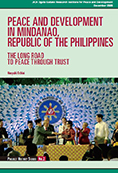Peace and Development in Mindanao, Republic of the Philippines—The Long Road to Peace through Trust

The JICA Ogata Sadako Research Institute for Peace and Development publishes the “Project History Series” of books, which chronicle JICA's projects, including their trajectories and results. “Peace and Development in Mindanao, Republic of the Philippines—The Long Road to Peace through Trust” is the third English-language book in this series. Twenty-five installments in Japanese have been published so far.
Until the early 20th Century, the Philippine island of Mindanao was home to Muslims who formed about 90% of the island population. However, in 1912, the resettlement policy adopted by the American territorial government created an influx of large numbers of Christian settlers. Post gaining independence from the United States, the new government further strengthened the resettlement policy by offering land grants to the settlers, legally obtaining the land of the indigenous Muslims. A half-century of incessant fighting for their own justice resulted between the two groups—the Christians to protect the new paradise they had worked hard for and the Muslims to protect their rights and ancestral land. Armed groups seeking autonomy and independence from the Republic of the Philippines were formed by Muslims.
The book describes how the armed struggle unfolded over time. The Japanese government and JICA have assisted the Mindanao peace process for a long time. They contributed to a peaceful resolution and continued peacebuilding through a multifaceted approach, including participation in the International Monitoring Team and support of socio-economic development in the region to mitigate conflict.
The author states that there is a tendency to view the Mindanao conflict as a straightforward struggle between Christians (the Philippine government) and Muslims (the MILF, Moro-Islamic Liberation Front), but the framing of conflicts on Mindanao in an entirely religious context is overly simplistic. He points out that ending the conflict between the Christians and Muslims is not enough for Mindanao to truly be at peace. At times the social control structure breaks down between the clans, and feudalistic conflicts rapidly escalate over trifles. Therefore, he asserts, the involved parties must have a broader understanding of their struggle and take ownership of what they do.
scroll